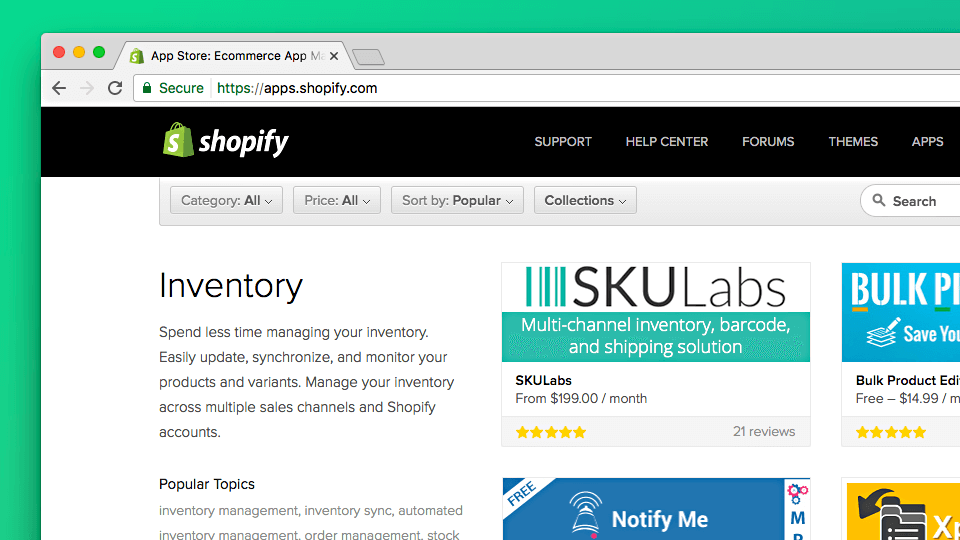
For most ecommerce retailers, one of the first steps to a successful launch is choosing the right shopping cart platform to host your store. If you’ve started this search already, you’ve likely seen a lot of options out there that may work for you. The myriad of carts out there will generally advertise the same concepts: responsive themes, fast performance, search engine optimization, etc.
Ecommerce has grown very rapidly since it was introduced in the late 90s. Year after year, online retail grows in market share and more sellers want a piece of the action. Due to the ever-increasing demand of aspiring ecommerce merchants, there are more shopping carts to choose from than ever. How can someone new to the industry know which platform is right for their needs?
Fortunately, we’re here to help. Our team spent decades working in ecommerce, as developers, designers, retail managers, and even business owners. We continue to hear from customers every day about their shopping cart choices and what frustrations might lie down the road when making the wrong choice.
Choosing a shopping cart isn’t to be taken lightly – this is the foundation that you’ll be laying your store upon. Once you’re on board, it’s very hard to get off. The last thing a growing business needs to worry about is transitioning to a new shopping cart once they figure out their current one isn’t getting the job done. To avoid that, let’s dig in and find the right shopping cart for you:
4 things to look for in a shopping cart
There are over 180 different shopping cart platforms in use today. To be perfectly honest, most of them aren’t worth your time. Ecommerce platforms that were developed over 10 years ago tend to still be on the market today, even though their offering hasn’t aged well in that time.
Business owners (both current and prospective) have their own set of priorities in mind when looking for the right shopping cart solution to get started on. However, there are a few key qualities that any cart you’re considering should have to be worth any amount of your time:
Strong integration support
Possibly the most important aspect of your shopping cart platform is its ability to connect to the other tools and services you’ll be using to run your business. No cart can be expected to do everything for you, but it is a host of some of your most critical data. You should confirm that your inventory management solution, accounting software, shipping tools, tax tools, and whatever else you use can connect to your store. If these integrations aren’t readily available, you could be in for a tough time working around that limitation.
Simple, modern theming
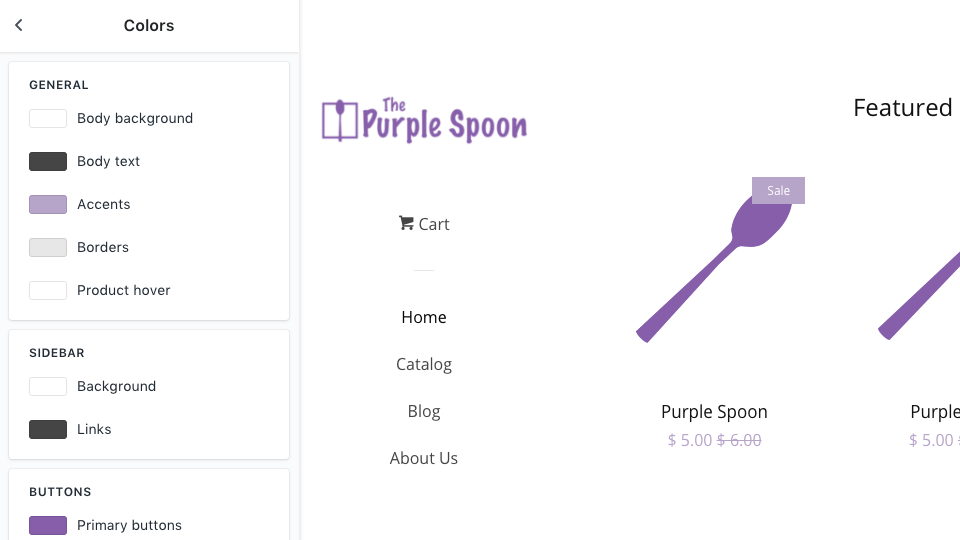
Design, both for usability and aesthetics, is enormously important in today’s Web. Shoppers will expect your store to feature a clean, simple, and attractive appearance. They’ll also need it to work consistently on whatever device they’re browsing on, be it a desktop, laptop, tablet, or smartphone. That’s why it’s more important than ever that the right shopping cart have a wide range of modern themes to choose from. They should also have easy support for theme customization or do-it-yourself design.
The right payment gateways

A shopping cart can’t sustain your business if your customers can’t pay you through it. While virtually every platform out there has support for the top payment processors on the market, like Stripe and PayPal, your business may have need for a different solution. If you’re selling from outside the US, or if you’re serving a niche market that Stripe or PayPal don’t support, check to make sure the cart has access to a payment gateway that’s right for your business.
Performance without hand-holding

Today’s online shoppers expect a store to load quickly and reliably every time. About half of consumers expect a web page to load in 2 seconds or less – if it hits three, that half will abandon the shop completely. If your store grosses $1,000 in sales per day, a 1-second page delay could cost you over $25,000 in lost sales every year.
This level of performance is demanding, but it’s easily attainable on a modern web platform and some smart decision making along the way. You shouldn’t have to go back to school and learn about compression algorithms just to keep your online store moving quickly. Make sure your shopping cart of choice has a proven reputation for speed and reliability.
Note 1 – “SEO” features: Many shopping carts advertise that their platform is optimized for search engine placement. They may talk up features like meta tags, alt tags, and automatically updated XML sitemaps. However, SEO has changed a lot in the last few years – even the term “SEO” has become less substantial in that time. Today, you’ll have a lot more work on your hands to ensure that your site can place competitively in search results. Don’t put too much stock in the claims set by a cart advertising these sort of features.
Note 2 – Pricing: There is often a high cost to compromise, and in few places can it be more apparent than your shopping cart platform. Every day, prospective sellers pass up the right shopping cart for their needs in favor of a less capable but less expensive option. As you grow (and we hope you do), the monthly fee you might pay for a cart platform will become an insignificant percent of your business expenses. Barring extreme circumstances, implementing the right solution for your needs is going to be more beneficial than compromising on a cheaper alternative.
Cloud-hosted vs self-hosted shopping carts
One important distinction between various shopping carts is how they are licensed and hosted. Licensing standards are all over the board, ranging from freely available open source platforms up to sophisticated cloud deployments with ongoing licensing premiums. Choosing between cloud-hosted and self-hosted carts often boils down to a matter of both licensing and maintenance costs.
However, the true nature of these costs can be deceiving at first glance, which is why we believe that self-hosted shopping carts should be approached with extreme caution. While they can sometimes be deployed and configured fairly quickly, self-hosting requires much more hands-on effort than cloud solutions. As your business grows, you may soon find yourself needing a full-time developer and system administrator on staff to keep your shop running smoothly.
With that warning out of the way, let’s compare what we consider to be the top cloud-hosted and self-hosted options for most businesses:
Best cloud-hosted shopping carts
Shopify:
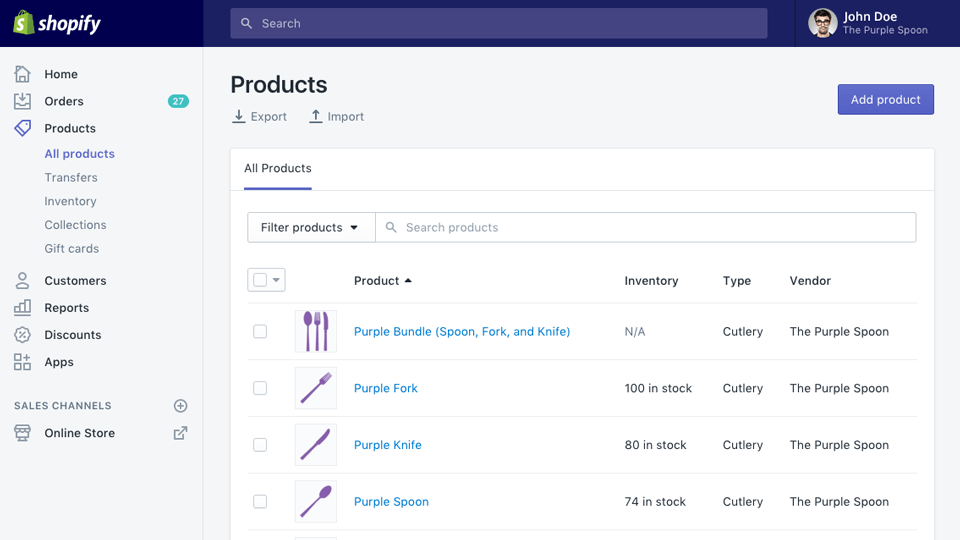
Since its founding in 2004, Shopify has taken the ecommerce industry by storm. It’s grown from a fairly simplistic cloud shopping cart to a fully-fledged ecommerce powerhouse. That’s why it’s worth over $7 billion based on its trading on the NYSE.
The reason behind Shopify’s success is quite simple: it strikes the right balance of feature set and ease of use. Shopify is probably the easiest shopping cart to set up and start selling with. It’s also the most widely supported platform by third-party services for things like accounting, shipping, and inventory management.
BigCommerce:
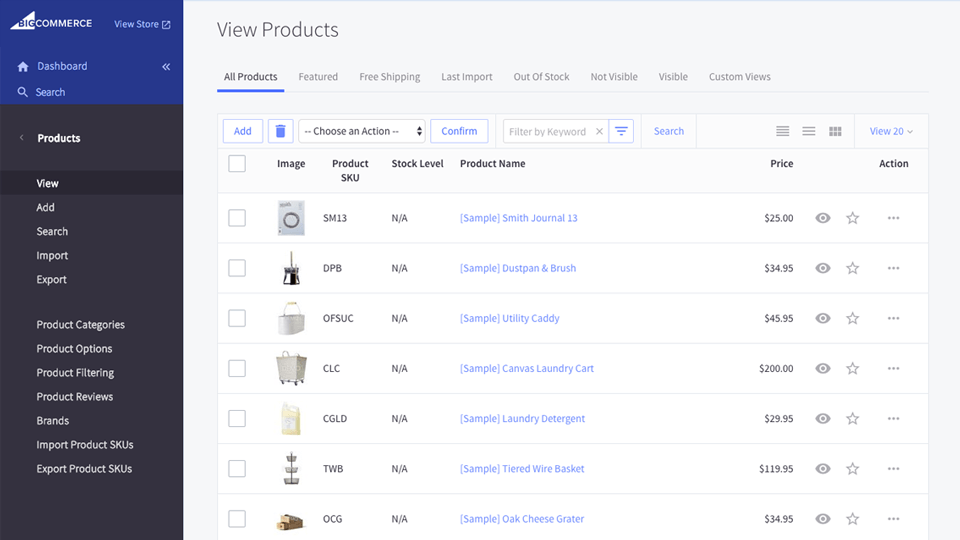
If anyone is putting pressure on Shopify from behind, it’s BigCommerce. Founded in 2009, BigCommerce is the bootstrapped underdog that has taken a sizable slice of the cloud-hosted ecommerce pie. They offer a tightly designed, polished solution that is more than adequate for the vast majority of ecommerce needs.
BigCommerce may have an edge on Shopify in regards to their built-in B2B sales support through their use of customer groups. They also support more option sets per product out of the box, allowing sellers to put together more complicated product configurations. Unlike Shopify, BigCommerce doesn’t charge transaction fees for orders processed via third-party gateways like PayPal.
Long story short: you can’t go wrong with either of these solutions. Both Shopify and BigCommerce offer excellent theme support, top-notch app and plugin support, and dead simple setup and use.
Best self-hosted shopping carts
Magento:
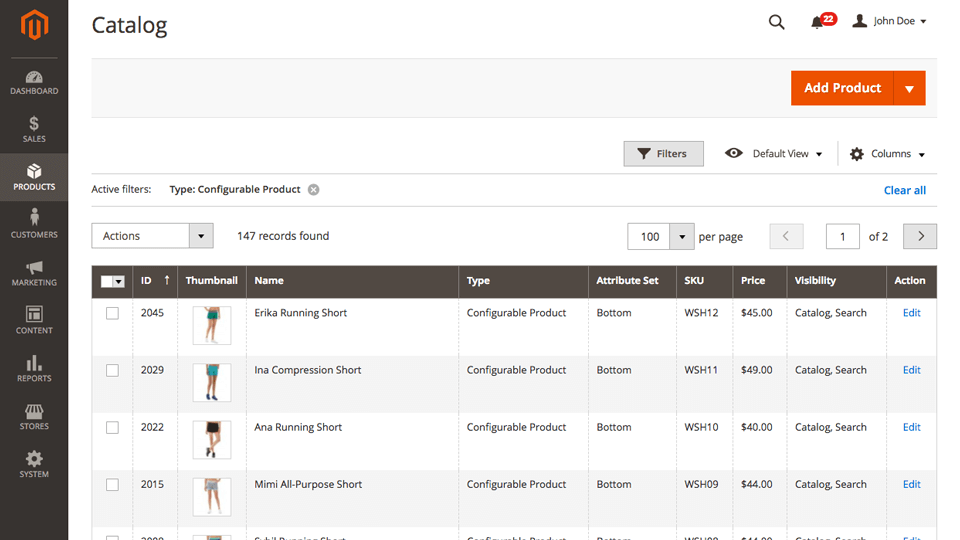
Magento is arguably the most well-known and most successful open source shopping cart platform out there. For a long time, it was the most widely downloaded and installed shopping cart on the web, though it’s since fallen to third place behind WooCommerce and Shopify. However, it remains the platform with the most potential for customization by a skilled design and development team.
Where Magento really stands out in today’s crowded market is its top-notch localization design. International sellers can have separate language files and settings so that shoppers can browse in the locale of their choice. Its multi-store system combines multiple storefronts under a single backend administration system. This is perfect for sellers that are covering different regions and markets.
WooCommerce:
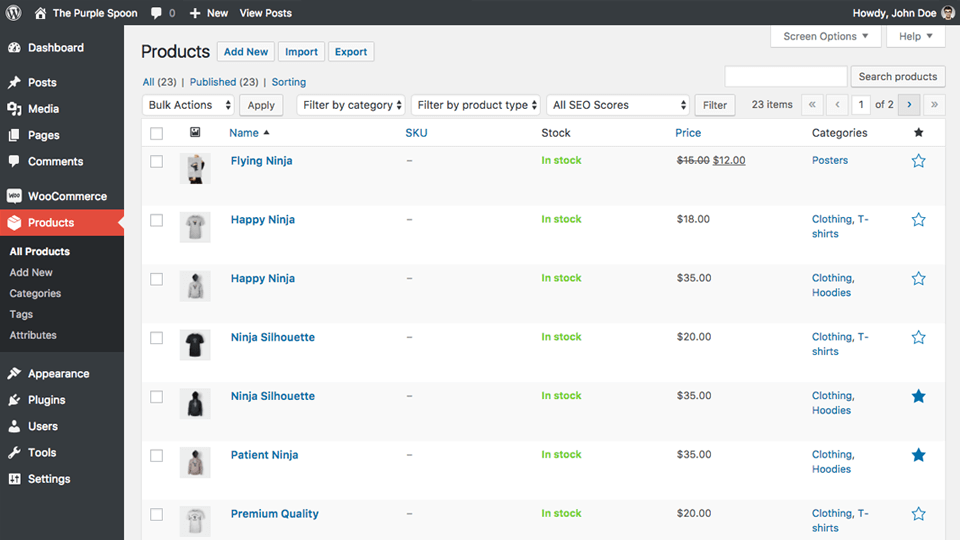
The youngest shopping cart on this list is also the fastest growing. Unlike standalone platforms like Magento, WooCommerce started life as a simple WordPress plugin, and it’s still designed to live alongside an existing WordPress blog or website. This makes WooCommerce easier to set up and use than Magento, and its design nature makes it especially attractive for Amazon affiliate sellers.
By sheer volume, WooCommerce is the most widely installed shopping cart platform in history, with millions of recorded deployments. However, it’s safe to assume that the vast majority of those installs have never generated any revenue – it’s much easier to download a WordPress plugin than it is to get your first sale.
The right shopping cart for most businesses
Naturally, we can’t assert that our top pick is the right shopping cart for 100% of ecommerce scenarios out there. Life just isn’t that simple, unfortunately. With that said, we feel that Shopify is the right shopping cart for the vast majority of people looking to get started with their own storefront. And they aren’t paying us to say that.
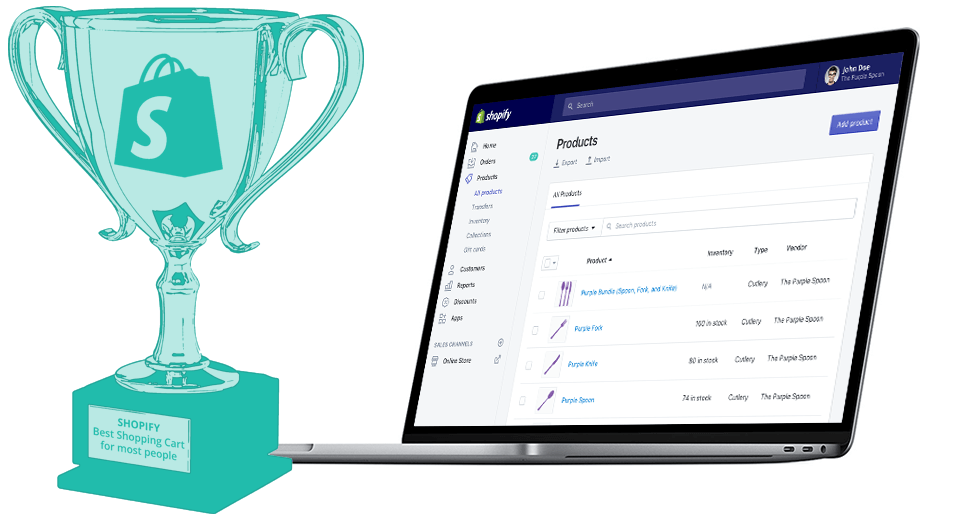
Shopify has the most support among designers, developers, payment gateways, and third-party services (like ours). It has some of the best setup, theming, and administration tools available today. Best of all, it packs everything you need (and nothing you don’t) into a simple, attractive package that anyone can quickly get the hang of. The right shopping cart gets you up and running quickly and then gets out of your way. Shopify does that better than any other cart we’ve seen.
The main knock people have against Shopify is its pricing. Not only does the service cost more per month than many of its competitors, but Shopify is one of the only shopping carts that list a transaction fee per processed order. Fortunately, this credit card rate is only for orders charged using the built-in payment processor, and it’s competitive with the rates offered by separate providers like PayPal and Stripe. There is an additional transaction fee for orders processed via external payment gateways (like PayPal or Amazon Payments) but it’s greatly reduced as you progress to the higher pricing tiers.
To reiterate a warning that I emphasized above, I strongly encourage the vast majority of sellers to opt for a cloud-hosted shopping cart solution, even if that means paying a higher monthly cost for the service. I say this as a 10-year ecommerce veteran with a fair amount of experience launching and maintaining self-hosted cart deployments. Even though I know how to deploy a Linux private server and get a fast and smooth Magento instance running on it, I know my time is better spent on other aspects of ecommerce than spent acting as a developer and system administrator. Between design, marketing, customer service, and order fulfillment, you have way too much on your plate already without having to worry about security patches or database operation limits.
Wrapping Up
Choosing the right shopping cart is not a task to be taken lightly. While we have a recommendation for the vast majority of businesses, your needs are unique to you alone. You owe it to yourself and to your growing business to do your research, consider each option, and make a confident choice to move forward with. Once you have a solution in mind, check to make sure it’s on our list of connected partners at skulabs.com/partners

